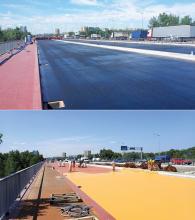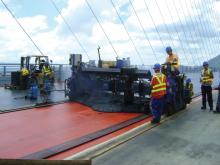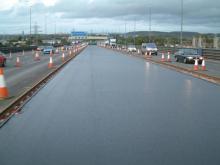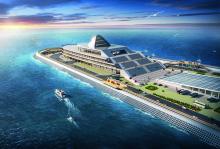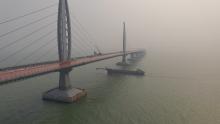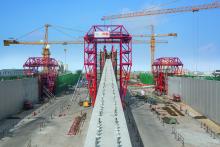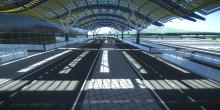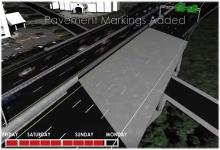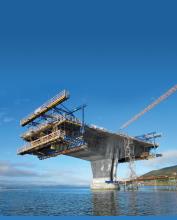Turkmenistan’s new bridge is benefiting from a novel sealing system that will optimise working life as well as maximising safety. A novel waterproofing solution is being utilised for the Turkmenabat - Farap Bridge in Turkmenistan. The project is of note as the structure is the longest metal span bridge in Central Asia. The client for the project is the state-owned firm Turkmenavtohowayollary, while the general contractor is Altcom Road Construction and the consultant engineer is Soyuztransproekt.
Stirling
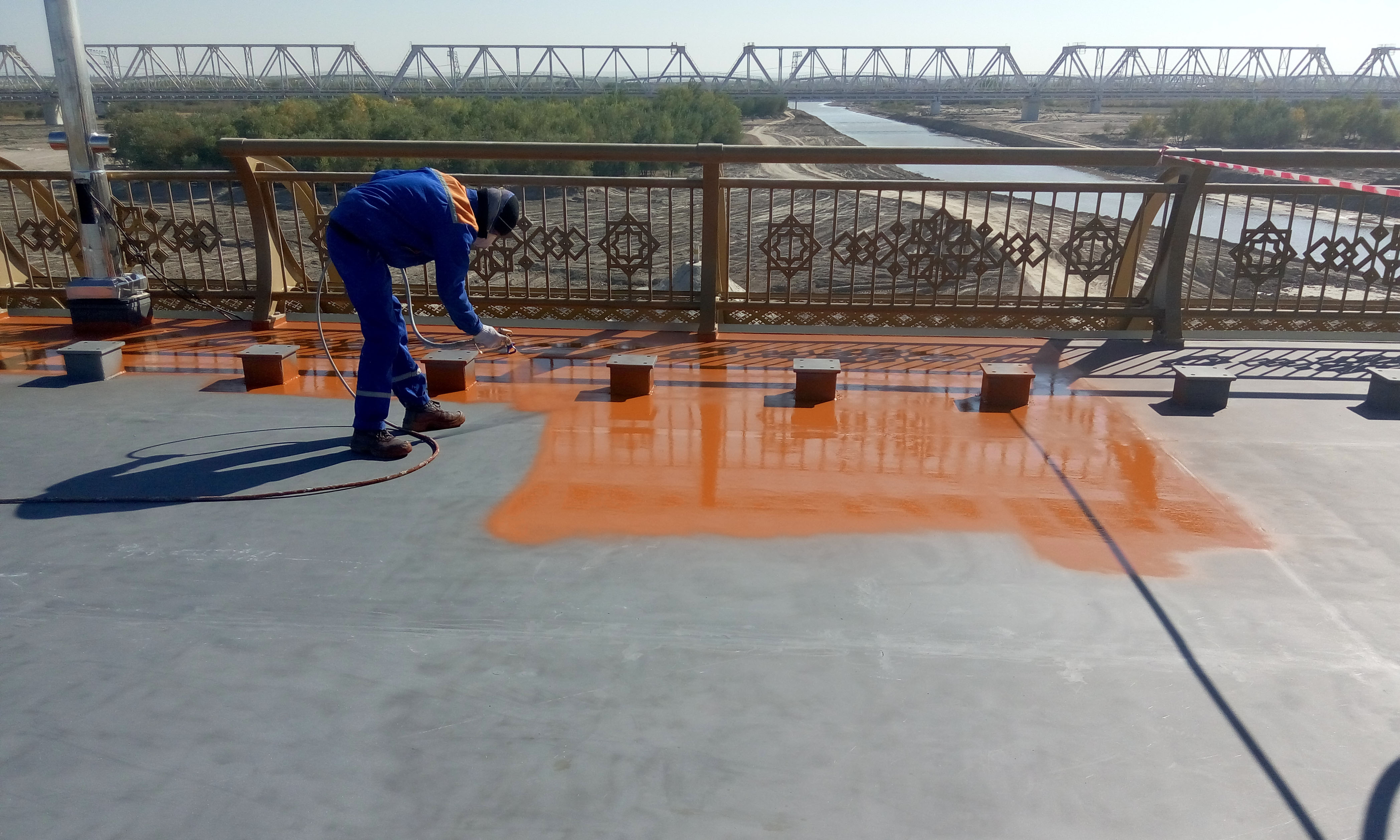
Stirling Lloyd's novel coating system was applied carefully to ensure maximum protection
Turkmenistan’s new bridge is benefiting from a novel sealing system that will optimise working life as well as maximising safety
A novel waterproofing solution is being utilised for the Turkmenabat - Farap Bridge in Turkmenistan. The project is of note as the structure is the longest metal span bridge in Central Asia. The client for the project is the state-owned firm Turkmenavtohowayollary, while the general contractor is Altcom Road Construction and the consultant engineer is Soyuztransproekt.
2314 Stirling Lloyd’s Bridgemaster product was selected as this combines waterproofing and wearing course duties. The system will be able to provide long-term protection for the newly-built Turkmenabat - Farap Bridge.
The M37 Turkmenabat–Farap road is located in Turkmenabad, the capital of Lebap Province, in the east of Turkmenistan. For part of its length, the road is carried by the new 1.6km-long Turkmenabat-Farap Bridge, which spans the River Amu Darya. The new bridge consists of two continuous beam system decks, each 800m long, carrying four traffic lanes (two in each direction) and pedestrian footpaths on either side of the bridge, across its 21.23m width, while it has a 34,000m2 deck.
This new route has provided easy access for HGVs and other traffic travelling through Turkmenistan to Uzbekistan and onwards to China. Before the new road and bridge was built, it could take up to three days to cross from Turkmenabad to Uzbekistan due to the significant queues that would form at the previously used small pontoon bridge, which also involved an additional 45km detour through the desert.
The construction of the new road bridge now allows this journey over the river Amu Darya and on to the border with Uzbekistan to be completed within 2-3 hours. It has also enabled the ancient trade route, the Silk Way, to be reopened, further strengthening the economic development of the country and reinforcing the region as an important international route to Europe from Asia-Pacific and South East Asia.
When it came to selecting the systems and materials to protect this new vital link, Stirling Lloyd’s Bridgemaster combined waterproofing and wearing course system was suitable due to its advanced Esselac resin technology providing resistance to the site’s sometimes severe weather conditions.
Design and construction of the bridge was a technical challenge that was successfully met by the Ukrainian companies Altcom Road Construction and design and engineering company Soyuztransproek.
More than 15 countries were involved in the project. As leaders in the development of waterproofing systems and pioneers of cold, applied systems, Stirling Lloyd sat alongside other external experts and technologies in being able to offer best advice and product solutions for the challenging project.
For the first time ever in Central Asia, Stirling Lloyd’s Bridgemaster system was specified for the construction of a paved bridge with a steel orthotropic plate. The firm also provided technical assistance during the specification stages as well as hands-on training and supervision during the application stage.
The Bridgemaster system was selected as it offered an 80% reduction in the dead weight of the traditionally used asphalt surfacing layer. This enabled the dynamic load the bridge could carry to be increased, while allowing a lighter design to be used. With technical support onsite throughout the application process, Stirling Lloyd was able to provide a quick response to the project’s technical and climatic challenges.
The construction area of the bridge is characterised by complex geological, hydrological and climatic conditions, including an average seismicity of magnitude 8. In addition, during Spring and Summer, weather conditions often result in significant rainfall and flooding in the vicinity, so it was important that the waterproofing and surfacing solution could withstand these severe climatic conditions.
Specified for its light weight, fast cure and durability, Bridgemaster provided an extremely high bond to the metal deck, enabling the waterproofing surfacing to act as a composite with the deck. It also gave good anti-skid properties, which it will retain, as well as resistance to the severe climatic conditions and high traffic volumes it will be exposed to.
Consisting of an impermeable flexible resin screed, an aggregate overscatter and a durable sealer coat, for its first application in Central Asia, Bridgemaster was applied to a depth of 12mm on the roadway and 8mm on the pedestrian footpath, reducing the seismic loadings on the structure's orthotropic steel plate.
The system's ease of application and rapid cure, even at some of the low temperatures experienced, helped ensure a quick installation with up to 3,000m2 being applied/day. Once the application was complete, Bridgemaster had provided the Turkmenabat- Farap Bridge with a durable, waterproof lightweight surfacing.
Kostiantyn Medovnikov, sales export manager for Central and Eastern Europe at Stirling Lloyd said, “As this was such an important international trade route for the country, it was important for the waterproof surfacing on the bridge to be as long lasting as possible and with such severe climatic conditions to contend with, it was clear from the conception stage that Bridgemaster was the best suitable long-term protection solution.”
A novel waterproofing solution is being utilised for the Turkmenabat - Farap Bridge in Turkmenistan. The project is of note as the structure is the longest metal span bridge in Central Asia. The client for the project is the state-owned firm Turkmenavtohowayollary, while the general contractor is Altcom Road Construction and the consultant engineer is Soyuztransproekt.
The M37 Turkmenabat–Farap road is located in Turkmenabad, the capital of Lebap Province, in the east of Turkmenistan. For part of its length, the road is carried by the new 1.6km-long Turkmenabat-Farap Bridge, which spans the River Amu Darya. The new bridge consists of two continuous beam system decks, each 800m long, carrying four traffic lanes (two in each direction) and pedestrian footpaths on either side of the bridge, across its 21.23m width, while it has a 34,000m2 deck.
This new route has provided easy access for HGVs and other traffic travelling through Turkmenistan to Uzbekistan and onwards to China. Before the new road and bridge was built, it could take up to three days to cross from Turkmenabad to Uzbekistan due to the significant queues that would form at the previously used small pontoon bridge, which also involved an additional 45km detour through the desert.
The construction of the new road bridge now allows this journey over the river Amu Darya and on to the border with Uzbekistan to be completed within 2-3 hours. It has also enabled the ancient trade route, the Silk Way, to be reopened, further strengthening the economic development of the country and reinforcing the region as an important international route to Europe from Asia-Pacific and South East Asia.
When it came to selecting the systems and materials to protect this new vital link, Stirling Lloyd’s Bridgemaster combined waterproofing and wearing course system was suitable due to its advanced Esselac resin technology providing resistance to the site’s sometimes severe weather conditions.
Design and construction of the bridge was a technical challenge that was successfully met by the Ukrainian companies Altcom Road Construction and design and engineering company Soyuztransproek.
More than 15 countries were involved in the project. As leaders in the development of waterproofing systems and pioneers of cold, applied systems, Stirling Lloyd sat alongside other external experts and technologies in being able to offer best advice and product solutions for the challenging project.
For the first time ever in Central Asia, Stirling Lloyd’s Bridgemaster system was specified for the construction of a paved bridge with a steel orthotropic plate. The firm also provided technical assistance during the specification stages as well as hands-on training and supervision during the application stage.
The Bridgemaster system was selected as it offered an 80% reduction in the dead weight of the traditionally used asphalt surfacing layer. This enabled the dynamic load the bridge could carry to be increased, while allowing a lighter design to be used. With technical support onsite throughout the application process, Stirling Lloyd was able to provide a quick response to the project’s technical and climatic challenges.
The construction area of the bridge is characterised by complex geological, hydrological and climatic conditions, including an average seismicity of magnitude 8. In addition, during Spring and Summer, weather conditions often result in significant rainfall and flooding in the vicinity, so it was important that the waterproofing and surfacing solution could withstand these severe climatic conditions.
Specified for its light weight, fast cure and durability, Bridgemaster provided an extremely high bond to the metal deck, enabling the waterproofing surfacing to act as a composite with the deck. It also gave good anti-skid properties, which it will retain, as well as resistance to the severe climatic conditions and high traffic volumes it will be exposed to.
Consisting of an impermeable flexible resin screed, an aggregate overscatter and a durable sealer coat, for its first application in Central Asia, Bridgemaster was applied to a depth of 12mm on the roadway and 8mm on the pedestrian footpath, reducing the seismic loadings on the structure's orthotropic steel plate.
The system's ease of application and rapid cure, even at some of the low temperatures experienced, helped ensure a quick installation with up to 3,000m2 being applied/day. Once the application was complete, Bridgemaster had provided the Turkmenabat- Farap Bridge with a durable, waterproof lightweight surfacing.
Kostiantyn Medovnikov, sales export manager for Central and Eastern Europe at Stirling Lloyd said, “As this was such an important international trade route for the country, it was important for the waterproof surfacing on the bridge to be as long lasting as possible and with such severe climatic conditions to contend with, it was clear from the conception stage that Bridgemaster was the best suitable long-term protection solution.”

